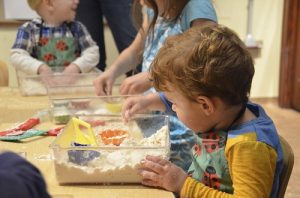Davina Richardson, Children’s Specialist Nurse at Bladder & Bowel UK, discusses toilet training children with autism and how to overcome issues that may arise.
Toilet training is an area of child development that worries many parents. It is not helped when there is conflicting information given by other parents, relatives, healthcare professionals and others. If your child has additional needs, or differences in development then toilet training becomes even more challenging.
Why might children with autism struggle with toilet training?
Communication differences:
Children who are on the autistic spectrum often have difficulties with understanding words, with non-verbal communication (picking up cues from facial expressions and body language) and with expressing their needs (saying what they want, feel or need).
This means that they may struggle with:
- Understanding the words for toileting and so may not understand what is expected of them.
- They may not have or be able to say the words to let others know that they need to wee or poo.
- May interpret language literally and therefore be confused by some of the expressions we use to describe weeing (passing urine) or pooing (opening bowels). E.g. going to the toilet is literally about going to a place. It does not describe doing a wee or poo.
Using picture cue cards and social stories may help overcome these issues
Social interaction differences:

Children who are on the autistic spectrum may not understand expected behaviour and may have difficulties with relationships.
Because of this they may:
- Not be interested in being the same as, or doing the same things as others
- They may not learn by imitating other people, in the way that many children do
- They may not be concerned about being wet or soiled
Using rewards to motivate may help. Discuss appropriate rewards with your child’s healthcare professionals. These should be something small that your child is interested in and which can be provided as soon as they have done what is expected of them.
Imagination differences:
Children who are on the autistic spectrum may not use imaginary or social play, they may be rigid in their thinking and struggle to understand what comes next, which means that they struggle if their familiar routines are changed.
This means that they:
- May assume that you know when they need help and not realise that they need to tell you.
- Changes in their routines are very confusing for them and may make them fearful or anxious.
- They may struggle to transfer knowledge: if they learn to do something in one. place they may not realise that they should do the same thing in other places e.g. if they learn to use the toilet at home, they may not realise they should do so at school as well.
Making changes slowly and gradually, with the support of picture cues or social stories may help them to feel safe and accept the changes better.
Sensory issues

Many children who are on the autistic spectrum have sensory problems. They may:
- be more sensitive than other children, or be less sensitive. They may have a mixture of increased sensitivity in some areas and reduced sensitivity in others
- have difficulty filtering sensory information that occurs at the same time. Most of us can ‘switch off’ to some information that we don’t need e.g. if there are lots of background noises when we are having a conversation, we can concentrate on the words being said to us and ignore the other noises. Children who are not able to filter information cannot ignore all the other noises, but also sights, sounds, smells etc. that are going on at the same time.
Try to think about how the toilet environment affects your child with their sensory need and try to make adjustments to help them. Your child’s occupational therapist may be able to make some suggestions.
How do these affect toilet training?
To be able to use the toilet appropriately and successfully we need to learn a series of skills, but learning these can be more difficult if children are on the autistic spectrum. Causes of the difficulties will vary according to how the autism affects them. Success with toilet training involves working out what is causing issues for the child and making changes to reduce the effect of the issues.
What can help?
Starting work on the skills for toilet training early is often successful as there has been less time for rigid behaviours and thought processes to become established.
Try to ensure that your child is having fruit and vegetables every day and is drinking plenty of water based fluids, as far as their behaviours and habits allow. Fruit and vegetables help prevent constipation, which can delay toilet training. Good intake of water based fluids (about 1 ¼ litres a day for children aged 2-4 years and about 1 ¼ – 1 ½ litres per day for children aged 5-11 years) helps develop a healthy bladder as well as prevent constipation.
Where can I get more information and support for toilet training children with autism?
Bladder & Bowel UK have lots of information on toilet training children with additional needs including autism on their website at www.bbuk.org.uk/children-young-people/children- resources/ that is free to access and download.
For individual advice consult your child’s healthcare professional or contact the Bladder & Bowel UK confidential helpline at email: bbuk@disabledliving.co.uk or telephone 0161 214 4591.


Comments are closed